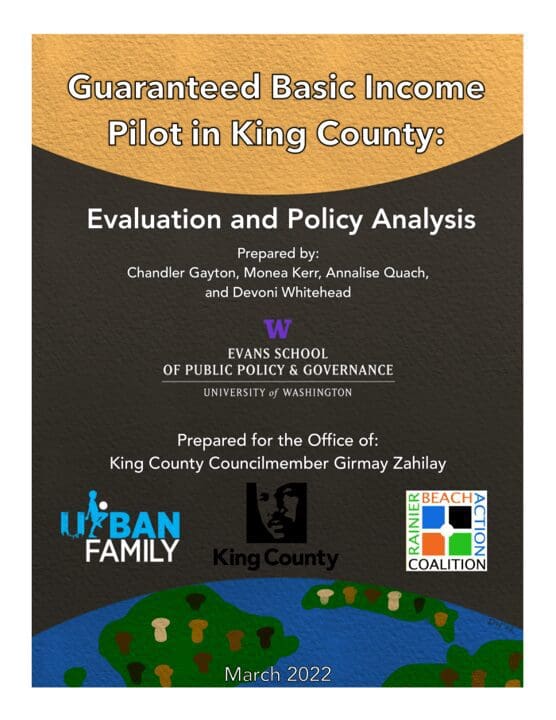By: Devoni Whitehead
Read original post here.
After a long journey filled with long nights, Zoom calls, and several rounds of report edits, I am SO proud to announce that my Evans School Capstone project on Guaranteed Basic income is finally completed. At the University of Washington Evans School, collaborative teams of MPA students are matched with public and nonprofit sector clients to solve organizational issues.I was selected, along with three other amazing students, Annalise Quach, Monea Kerr, and Chandler Gayton, to serve as Graduate consultants for the Evaluation and Policy Analysis for King County Councilmember Girmay Zahilay on his Guaranteed Basic Income Pilot for South King County.
Guaranteed Basic Income
Guaranteed Basic Income (GBI) is a program that offers unrestricted financial assistance to those who participate in it. Government assistance too commonly has restrictions on what funding can be used for (i.e. rent, food, etc.). With restrictions on spending capabilities, those who are cost burdened are unable to transfer government assistance to unexpected expenses that may incur. Studies have shown that cost burdened individuals who receive unrestricted funds are more likely to find employment, have better health outcomes, are less likely to spend money on alcohol or drugs, and experience overall better financial stability. GBI programs seek to capitalize on those findings to provide financial assistance in a way that allows individuals autonomy in their own budgets.
The King County Guaranteed Basic Income (GBI) pilot program was initiated by King County Councilmember (CM) Girmay Zahilay through community service operating grant allocations and repurposed office funds, to two community based organizations (CBOs), Rainier Beach Action Coalition (RBAC) and Urban Family. These funds allow for payments of $1,000 to each GBI participant for the duration of 12 months.
Each CBO has five participants, with a total of 10 participants. The CBOs have full authority in their design and implementation of the GBI process, as they have a comprehensive and historic understanding of what their clients and community needs, as well as having built trust with their communities. Both organizations serve District 2, which spans from the southern border of Seattle to the northern border of the Laurelhurst Neighborhood. Historically recognized as the most diverse population of King County, gentrification has pushed countless residents, who are disproportionately BIPOC, to the southern portion of the County. GBI programs provide unrestricted financial assistance to those who participate in them, providing participants with autonomy over their funds. This model is relatively new, and there is little research on best practices of such a program at this time.
Introduction
With the intention of creating a larger GBI program at King County, a research study for the pilot was requested by CM Zahilay. Our student consulting team for the University of Washington Evans School, was asked to conduct a series of reports on the program, which have been compiled here. The reports cover the following: 1) program model description as well as participant and staff experience with implementation; 2) mid-program participant experience; 3) GBI policy analysis; and 4) final evaluation of participants and staff.
Findings
Program Model and Participant Experience
Both CBOs distributed the GBI stipends in different ways with RBAC using direct deposit, and Urban Family using checks. In addition to stipends being distributed, each CBO provided monthly educational materials and feedback forms to each participating household. The purpose of this was to promote financial literacy, provide support alongside stipend distribution, and gain insights to any operational improvements that could benefit participants.
In regard to health, each participant interviewed mentioned reduced stress and better quality of life (more time spent with family, prioritizing school, etc.). Spending trends that each participant mentioned were: using GBI stipends to pay for rent and bills; starting and adding to savings; and spending on essential items such as food, clothes, and hygiene supplies.
Evaluation
Each participant was pleased with their CBO’s engagement and work and shared that they read and watched the educational materials provided by the CBOs every month. Additionally, all participants reported returning to some content regularly, most notably the budgeting information from the first month. Finally, numerous participants were greatly interested in the possibility of furthering the pilot, and assistance after the pilot’s conclusion, specifically mentioning that the program was not long enough to help them out of their financial positions.
Policy Analysis
In order for a GBI program to succeed at King County, the funding source, target population, eligibility criteria, selection process, operational organization, stipend amount and program duration must be tailored to the specific aims of the program (e.g., those who are extremely cost-burdened, youth and young adults transitioning out of foster care, geographic location, etc.).
The options presented for funding were various sources of public dollars the County has authority of, as well as private partners. Possible options include different sources of general fund dollars, current and possible future King County levies, and philanthropic dollars. Key trade-offs include sustainability, public support, and flexibility of dollars (how public dollars can be used for programs). Various combinations of stipend amount and duration used by other GBI programs illustrated the use cases for different program specific goals.
Tradeoffs between having a County operated program compared to a CBO operated program were also discussed. Key trade-offs include being able to leverage the trust that CBOs have with their participants and community compared to having more oversight of the program through County operations.
Final Evaluation
Each participant was grateful for the opportunity to have been selected for the program. However, the majority of respondents hoped for a longer duration pilot. The educational materials provided helped participants with easing into the conclusion. GBI funds provided no adverse effects on other government assistance that participants received (SNAP, TANF, Housing Choice Vouchers). Participants consistently shared that the guidance and leadership the CBOs provided made the process easier, specifically mentioning trust and familiarity. At the conclusion of the program, each participant reported decreased levels of stress, having a better understanding of budgeting, and becoming more financially literate. In order for a GBI program to be more effective, specific goals should be identified and clarified prior to the start of the program.
Reflection
As a long-time native of South King County, I was immensely moved by all of the stories and backgrounds of all the participants who were gracious enough to share their experiences with me and my team.
While only an hour at the time, the interviews not only allowed me to hear of the great ways that the funds and materials positively impacted their financial literacy, mental health and wellbeing, but they allowed me to form a personal connection with these households, and their lived experiences.
I found myself cheering and celebrating their financial and personal achievements along with them, as well as empathizing and sharing grief during personal emergencies or when systematic structures fail them. While I am glad that my team and I have completed such an astounding accomplishment, especially during the time of a global pandemic, it is rather bittersweet knowing that the completion of this project means the end of our regular update meetings. While my team and I acknowledge the financial constraints of expanding this program to a larger section of King County, we hope that these experiences and evaluations show insight to the impact of this program on the participants, as well as their families and community in South King County.
If you are interested in reading our complete project, you can find it here





















